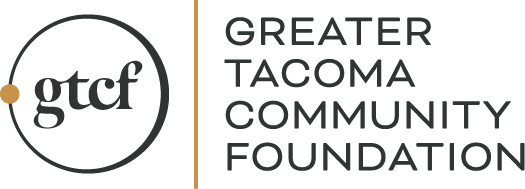
Community
9
2020
GTCF Youth Philanthropy Board Engages in Dialogue Many Adults Won’t
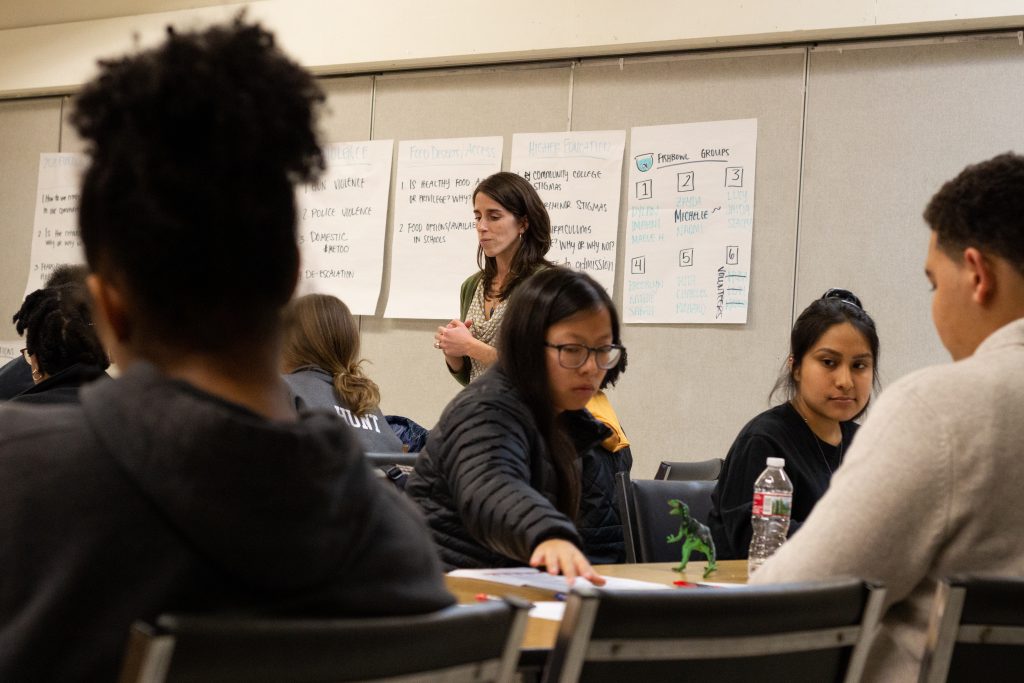
Jennifer Arnold of Reciprocity Consultants engages youth in a dialogue on diversity, equity, and inclusion.
Racial differences split GTCF’s Youth Philanthropy Board (YPB) in two at a recent meeting. It wasn’t a rift in the group. Breaking into discussion groups according to racial identity was part of a facilitated exercise to support deeper reflection about how racism shows up in our community.
“Noticing how I don’t have the same opportunities all of the time as my white peers is a bit concerning, so having these discussions is important.”
“Everyone had a piece of the puzzle on how to create conversations and dialogue,” Jennifer Arnold of Reciprocity Consultants explained. For the past year, GTCF has partnered with Jennifer to develop and enhance the YPB curriculum. Jennifer invited Julia Kagochi of Kagochi Consulting to guide YPB members in dialogue reflecting on their identity and experiences, with respect to diversity, equity, and inclusion in Pierce County. Julia used inquiry and feedback from previous sessions to create challenging conversations.
“You have to be vulnerable to talk about this stuff.”
Members separated into caucuses, also called affinity groups. One group was YPB members who identify as people of color, one group was members who identify as white. Members spoke openly in their caucus groups about their lived experiences with racism. Then, members brought their stories, challenges, and ideas back to the entire group for further discussion. “I think the youth engaged beautifully,” Jennifer reflected after the session.
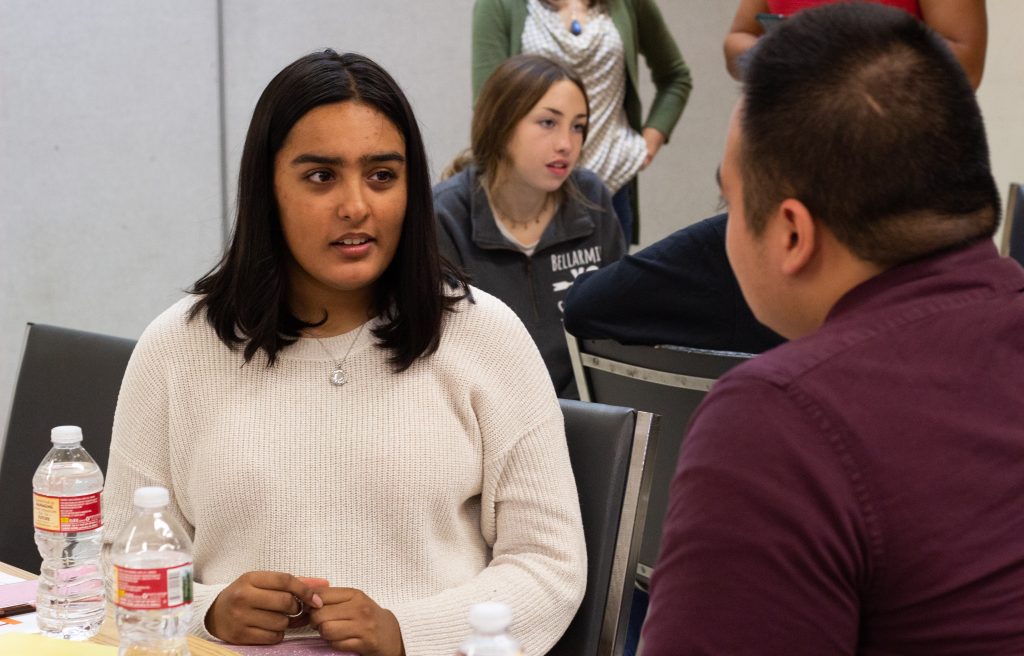
Charles, a 1st-year YPB member shared his perspective, “My mom is white, and my dad is black. Noticing how I don’t have the same opportunities all of the time as my white peers is a bit concerning, so having these discussions is important. You have to be vulnerable to talk about this stuff.”
Zayda, a 2nd-year YPB member who identifies as African-American, agreed that having open and honest dialogue paves the way for greater connection, “I like to sit and talk and understand where people come from. It is important for us to sit down and understand what we used to be, what is changing now, and how we can change that for the better.”
“I feel like people are afraid to talk about racism or just any of the ‘isms’ in general.”
“I’m white myself, my entire family is white, I grew up in a very white neighborhood, and I went to all white schools until I got to Jason Lee, which was very diverse,” explains Maeve, a 1st-year YPB member. “It is important to know about other cultures, and other people and how we relate, how we differ, and how that is important to everyday life. It’s good for world view.”
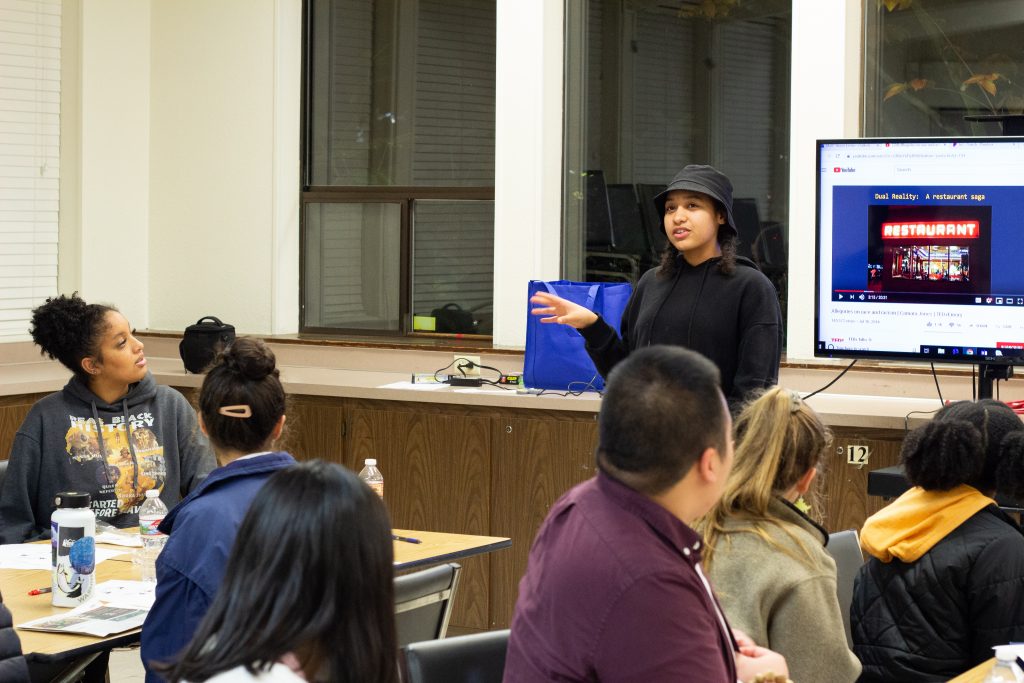
Census data indicates that in 2020 the 18-and-under population in the United States will be majority people of color. In less than a decade, adults under 30 will be majority people of color. By 2045, it is projected that the United States will become ‘majority-minority’, where the majority of the population will be non-white.
“I’m going to use what I learned to educate people around me about their privilege.”
While many people, organizations, and businesses in Pierce County value an equitable, diverse community, these demographic shifts point to the need for more intentional and ongoing conversation. Dialogues about racism can help foster empathy, understanding, shared commitment, and accountability for ending racism and inequities for a more thriving Pierce County now and into the future.
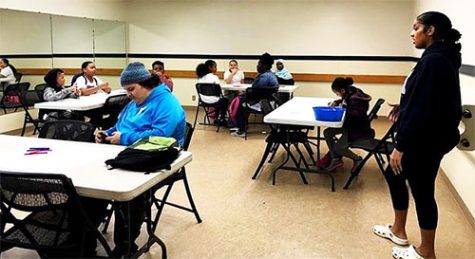
Zayda encountered challenges last year while working with children as an Americorps volunteer, “I would have a really hard time battling the obstacles of working under the DEI lens with the kids while trying to include equity. It’s hard to always advocate for youth when the people who are working with youth don’t want to hear what they have to say. I feel like people are afraid to talk about racism or just any of the ‘isms’ in general.”
Maeve plans to initiate more conversations like this, “I’m going to use what I learned to educate people around me about their privilege. I believe that education is important to developing schools and developing opportunities in lower-income neighborhoods.”
The facilitated caucus exercise Youth Philanthropy Board members participated in is a common tool for diversity, equity, and inclusion education. You can learn more about that tool and others through the links below or contact GTCF’s Community Impact team to get connected with additional racial equity resources.
Further Reading
Why People of Color Need Spaces Without White People
Going to the Root: How White Caucuses Contribute to Racial Justice
Caucuses as a Racial Justice Strategy : What We Have Learned
The US will become ‘minority-white’ by 2045, census predicts
America’s majority minority future
Julia Kagochi – Kagochi Consulting
Jennifer Arnold – Reciprocity Consulting
